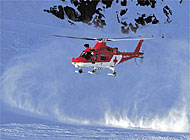Swiss Alpine Club celebrates 100 years of mountain rescue

The Swiss Alpine Club (SAC) this week celebrated the 100th anniversary of its emergency service with a helicopter rescue demonstration in the mountain resort of Grindelwald.
In partnership with the Swiss Air Rescue team, the SAC has saved thousands of lives since it created a nationwide emergency service for climbers in 1901.
As part of the demonstration, a member of the rescue team posed as a stricken mountaineer, clinging to a rocky ledge above a fast-flowing river.
Walter Stünzi, a member of the Swiss air rescue service, says the most dangerous part of the rescue operation is always the moment when the rescuer attempts to intercept the victim.
“The pilot can see neither the rescuer nor the person in distress,” Stünzi said in an interview with swissinfo.
“He or she has to rely on radio contact with the rescuer, who literally shouts commands to the cockpit like ‘up, up, down a bit’ as he tries to reach the spot where the trapped or injured person is located.”
Even during the nearly flawless Grindelwald demonstration, a strong gust of wind showed how difficult it was for the pilot to keep the helicopter stable during the operation.
As the wind died down, the rescuer succeeded in bandaging up the injured mountaineer, placing him in a makeshift stretcher and winching him to safety.
The whole operation took no more than a few minutes, but the organisers were quick to point out that real-life rescue attempts in sub-zero temperatures and blizzard conditions are far more dangerous and can require the assistance of several helicopter crews.
Each of the 14 helicopters currently in service is equipped with a miniature intensive care unit, where on-board doctors are trained to stabilise the sick or injured until the helicopter reaches the nearest hospital.
“The facilities on board are crucial, since many of the people we rescue are unconscious by the time they reach the helicopter,” Stünzi said.
Last year, the SAC’s rescue teams were called to the scene of a mountain accident nearly 400 times and helped over 500 people. Stünzi estimates that each helicopter intervention costs in the region of SFr3,000-5,000 ($1,600-2800).
Though the club is best known for its daring helicopter rescues, much of its resources go into programmes of education and prevention designed to teach young people about the risks involved in hiking and climbing in mountainous regions.
“The air rescue service may be high profile but it is only a small part of what we do,” Budde told swissinfo. “Many of our members are engaged in school education programmes which we hope will inform children about the risks of mountaineering.”
“Prevention of an incident is better than a costly emergency evacuation,” he added.
The SAC relies on membership fees as well as the financial support of individual Swiss cantons. The Swiss government does not directly subsidise rescue operations, though club officials hope the Grindelwald rescue demonstration will encourage politicians to re-examine the need for additional funds.
Ninety-one per cent of those rescued by the SAC are not club members. “This figure alone demonstrates that we are a public service, just like the fire, ambulance and other similar emergency services,” said Louis Salzmann, president of the club’s rescue commission.
So what will mountain rescue operations be like by the time the SAC celebrates its 200th anniversary 100 years from now? The need for an emergency rescue service, says Budde, will remain as long as people still want to explore the mountains.
“I believe there will always be a need for mountain rescue, but of course in the future the technology will be more advanced which means people will be found faster.”
by Ramsey Zarifeh

In compliance with the JTI standards
More: SWI swissinfo.ch certified by the Journalism Trust Initiative








You can find an overview of ongoing debates with our journalists here . Please join us!
If you want to start a conversation about a topic raised in this article or want to report factual errors, email us at english@swissinfo.ch.